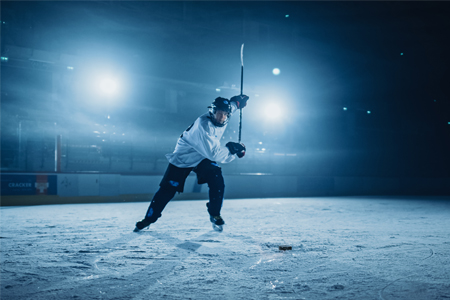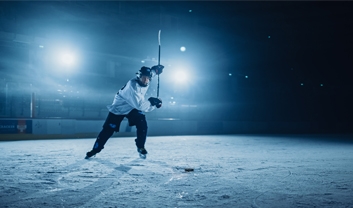
Hockey is a challenging and entertaining winter sport. But the slippery ice and high-speed gameplay can promote the risk of injury. It is important for players, parents, and coaches to stay aware of the type of injuries that can be sustained in hockey. This awareness will help to ensure that the proper precautions are taken to avoid these injuries.
Here are some of the top orthopedic injuries sustained in hockey:
- AC joint separation
The acromioclavicular (AC) is a joint in the shoulder that can be separated, a common injury in hockey. This can occur from falling on the ice, hitting an opponent, or being checked into the boards causing the clavicle to separate from the scapula. Shoulder pads and avoiding falls or impact on the outer shoulder are helpful preventative measures. - Shoulder Dislocation
A dislocated shoulder occurs when the humerus bone, in your upper arm, comes out of the socket, or scapula, in your shoulder. Similar to a separated shoulder, this can occur from hard falls or hits to the shoulder. It is important to seek immediate medical attention for a dislocated shoulder because, without proper treatment, the risk of dislocating the shoulder again increases significantly. - ACL Sprain/Tear
The anterior collateral ligament (ACL) is a ligament in the center of the knee which helps to stabilize the knee by preventing the tibia from sliding forward. ACL sprains or tears typically occur from quick and frequent movements as well as sudden changes in direction, common maneuvers in hockey. While complete ACL tears often require surgical intervention, less severe sprains often require conservative treatment only. - MCL Sprain/Tear
The medial collateral ligament (MCL) is a ligament in the inner part of the knee that prevents the femur from sliding from side to side. The MCL can be torn or sprained when the outer part of the knee endures a hit causing the MCL to stretch or tear. Depending on the severity of the injury, surgery may be indicated, but most often MCL tears and sprains can heal without surgery.
There are many factors that increase the risk of injury in hockey including high-speed collisions, rigid boards, and a slippery skating rink. Thus it is important to understand the type of injuries one can sustain on the rink and how to prevent them.
If you have been injured while playing hockey or are interested in learning what prevention methods will help you avoid injury, contact Dr. Mithoefer for a consultation today!
Dr. Kai Mithoefer is board certified in both Orthopedic surgery and Orthopedic sports medicine and is a fellowship trained shoulder specialist. Dr. Mithoefer is an internationally recognized specialist for complex shoulder and knee injuries with over 15 years of experience with the treatment of work related injuries. Dr. Mithoefer has published more than 100 scientific articles and book chapters and is a frequent speaker at national and international orthopedic meetings.











